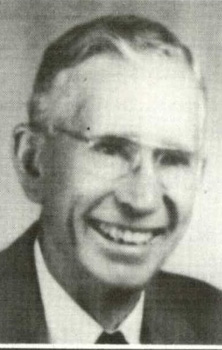
Benjamin Franklin Wheeler (1878-1954)
Inducted 1997
Highlights
In 1898 Wheeler purchased an abandoned seedling grove and is credited with being one of the first to bud Navel and Valencia oranges onto Cleo rootstock. His packinghouse was one of the first to use fungicides and water-based wax for fresh fruit. Wheeler pioneered the use of drainage wells to conserve fresh water, and drain tiles to hold the water table at the proper level to permit trees to attain enough size and production level to be profitable.
Oviedo
Cleo Rootstock
Nelson & Company, Inc.
Citrus Inspection Service
Oklawaha Citrus Processors Cooperative
B&W Canning Company
Dolemite Lime
Wheeler Fertilizer Company
Florida Citrus Mutual
Bio
Benjamin Franklin Wheeler was born in Dade City, Florida, on January 2, 1878. When his father died in 1889, the family relocated to his mother’s hometown of Oviedo, Florida, where young Benjamin got a job as the telegraph operator for the Atlantic Coast Line as a way to support his family. Despite being 16 years old at the time, Wheeler had only received a sixth grade education.
It was while working for the Atlantic Coast Line that Benjamin Wheeler first saw fresh citrus being shipped in barrels to the northern markets. After the Freeze of 1894-1895 many groves and associated businesses were abandoned. In 1898 Wheeler purchased an abandoned seedling grove, where he worked it with mules and horses when he wasn’t working at the Atlantic Coast Line. He budded some of the trees with Dancy tangerines and began packing and shipping through a small packing house that was part of the grove. He is also credited with being one of the first to bud Navel and Valencia oranges onto Cleo rootstock. As Wheeler acquired more citrus groves, he also became involved with the cultivation of celery, a stopgap for many troubled growers while the groves recovered from the freeze.
In 1908, he married Georgia Lee and together they had three children: Clara Lee, Benjamin Franklin, Jr. and Miriam Louise. That same year he became partners with C.F. Brannon and Steen Nelson in operating the Nelson Brothers Packinghouse. In 1923, he bought the company and renamed it Nelson & Company, Inc. He was also instrumental in developing the Citrus Inspection Service. His packinghouse was one of the first to use fungicides and water-based wax for fresh fruit. In 1948, when over-planting caused a fruit glut on the market, he helped organize the Ocklawaha Citrus Processing Co-op in 1949 which consisted of seventeen fresh fruit shippers that had signed contracts with several concentrate plants. In 1952, this organization bought interest in B&W Canning Company, of which Wheeler became a director.
Wheeler pioneered the use of drainage wells to conserve fresh water, and drain tiles to hold the water table at the proper level to permit trees to attain enough size and production level to be profitable. He also pioneered the use of dolomite lime as being the least expensive way for a grower to get magnesium into his grove. With the founding of the Wheeler Fertilizer Company in 1932, he used dolomite as a filler in most of his fertilizer mixtures. In 1939-1940, he planted the first Orlando Tangelos on Cleo and Sour Orange rootstock in Seminole and East Orange counties. He was one of the first to use a hedging machine in his groves in Central Florida. Wheeler also acquired a citrus concentrate plant with the assistance of a business partner in Leesburg.
Wheeler served two terms as Seminole County Commissioner, was a long-time member of the Oviedo City Council, and helped organize the Seminole County Chamber of Commerce. He was one of the original organizers of Florida Citrus Mutual. He is credited with ensuring that every citrus grower in Seminole and East Orange counties joined the new organization in order to bolster membership. He also organized the Citizen’s Bank of Oviedo for citrus and vegetable growers of Seminole County, acting as the bank’s president until his death in 1954. He was a deacon and Sunday School superintendent for more than 30 years in the Oviedo First Baptist Church, which his father helped establish in 1869. Wheeler was also a trustee of Bob Jones University and a member of the Advisory Council of Stetson University. And after his death in 1954, it was found that he had been supporting a missionary in Africa for over 10 years.
In recognition for his leadership in the citrus industry, the Florida State Commerce Building dedicated a chair to Wheeler. He was honored as an outstanding member of the citrus community when he was inducted into the Florida Citrus Hall of Fame in 1997.
Wheeler’s son, B.F. Wheeler, Jr., continued his father’s success in the citrus industry, becoming one of the most respected citrus men in the state.
